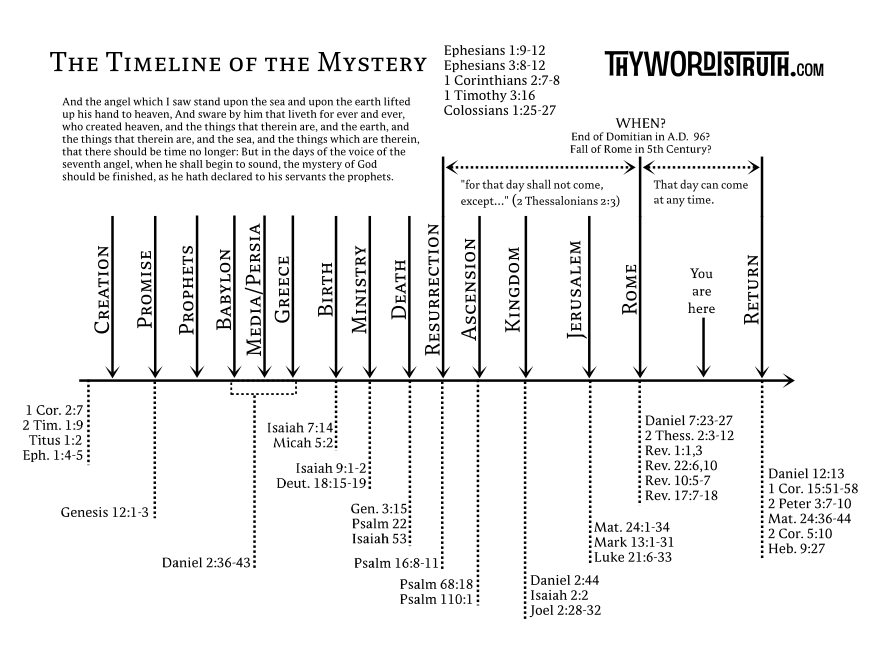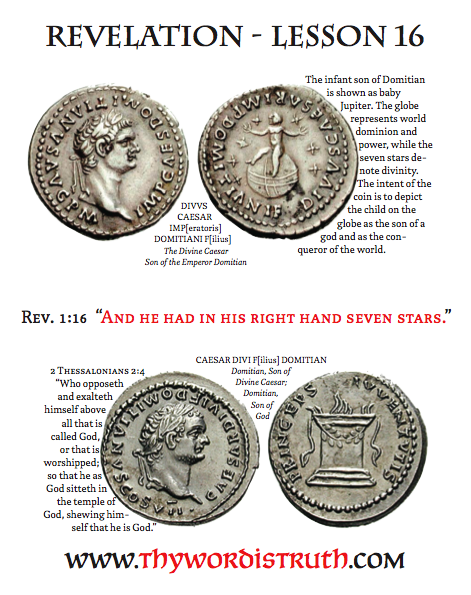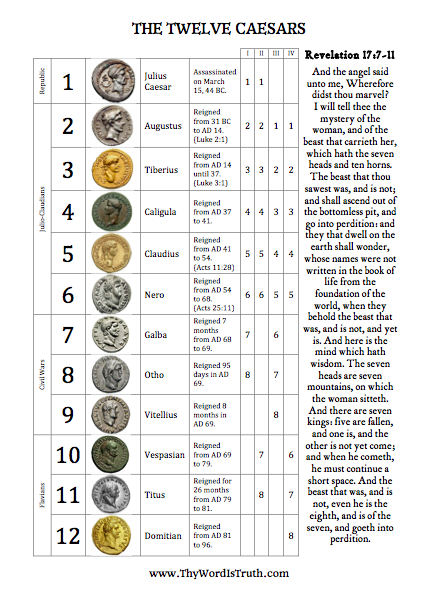25 Lessons on Revelation
For the most recent version of these notes, please visit our companion website REVELATION.study. There you will find 53 lessons on Revelation with audio and handouts. Very soon, the class notes will also be posted.
Does the book of Revelation tell us that the end of the world is near? Does the book of Revelation tell us anything about the end of the world? Did you know that the book of Revelation repeatedly says that it is about events that were to come to pass soon after it was written? How can we hope to understand this beautiful book if we ignore those clearly stated time frames for its fulfillment?
Revelation was written to provide comfort and encouragement to those first century Christians who were being persecuted and killed by the Roman empire. They must have wondered if God had forgotten about them, and they must have wondered how the church could possibly prevail against the might of Rome. The book of Revelation was written to answer those questions.
The materials on this website are a complete course on the book of Revelation. They begin with a lengthy but vital introduction and then proceed on a verse by verse walk through the book. Each class includes a complete transcript, colorful handouts, and an audio copy of the lesson in the MP3 format - all free of charge. Please study the book carefully, leaving your preconceptions behind. Revelation is meant to be understood, and it can be understood!
Lesson 1
IntroductionClass Notes (PDF format)
Revelation Road Map
Handout for Introductory Classes
MP3 Audio File of Lesson 1
Lesson 2
Introduction, ContinuedClass Notes (PDF format)
MP3 Audio File of Lesson 2
Lesson 3
Introduction, ContinuedClass Notes (PDF format)
MP3 Audio File of Lesson 3
Lesson 4
Introduction, Continued & Revelation 1:1-3Class Notes (PDF format)
Class Handout (PDF)
MP3 Audio File of Lesson 4
Lesson 5
Revelation 1:4-19Class Notes (PDF format)
MP3 Audio File of Lesson 5
Satellite Image of Patmos
Lesson 6
Revelation 1:20 - 2:29Class Notes (PDF format)
Class Handout (PDF)
MP3 Audio File of Lesson 6
Lesson 7
Revelation 2:18 - 4:3Class Notes (PDF format)
Class Handout (PDF)
MP3 Audio File of Lesson 7
Lesson 8
Revelation 4:4 - 5:10Class Notes (PDF format)
Class Handout (PDF)
MP3 Audio File of Lesson 8
Lesson 9
Revelation 5:9 - 6:11Class Notes (PDF format)
Class Handout (PDF)
MP3 Audio File of Lesson 9
Lesson 10
Review & Revelation 6:12-17Class Notes (PDF format)
Class Handout (PDF)
MP3 Audio File of Lesson 10
Lesson 11
Revelation 7:1 - 8:2Class Notes (PDF format)
Class Handout (PDF) (Large!)
MP3 Audio File of Lesson 11
Lesson 12
Revelation 8:3 - 9:12Class Notes (PDF format)
MP3 Audio Files of Lesson 12
Lesson 13
Revelation 9:3 - 10:7Class Notes (PDF format)
Class Handout (PDF)
MP3 Audio File of Lesson 13
Art by William Blake
Lesson 14
Revelation 10:8 - 11:10Class Notes (PDF format)
Class Handout (PDF)
MP3 Audio File of Lesson 14
Lesson 15
Revelation 11:11 - 12:4Class Notes (PDF format)
Class Handout (PDF)
MP3 Audio File of Lesson 15
Lesson on the Kingdom
Lesson 16
Revelation 12:3 - 13:2Class Notes (PDF format)
Class Handout (PDF)
MP3 Audio File of Lesson 16
Lesson 17
Revelation 13:1-2Class Notes (PDF format)
Class Handout (PDF)
MP3 Audio File of Lesson 17
Lesson 18
Revelation 13:3-18Class Notes (PDF format)
Class Handout (PDF)
MP3 Audio File of Lesson 18
Lesson 19
Revelation 13:18 - 14:12Class Notes (PDF format)
Class Handout (PDF)
MP3 Audio File of Lesson 19
Lesson 20
Revelation 14:13 - 16:11Class Notes (PDF format)
Class Handout (PDF)
MP3 Audio File of Lesson 20
Lesson 21
Revelation 16:12 - 17:18Class Notes (PDF format)
Class Handout (PDF)
MP3 Audio File of Lesson 21
Lesson 22
Revelation 18:1 - 19:3Class Notes (PDF format)
Class Handout (PDF)
MP3 Audio File of Lesson 22
Lesson 23
Revelation 19:4 - 20:3Class Notes (PDF format)
Class Handout (PDF)
MP3 Audio File of Lesson 23
Lesson 24
Revelation 20:4 - 21:14Class Notes (PDF format)
Class Handout (PDF)
MP3 Audio File of Lesson 24
Lesson 25
Revelation 21:15 - 22:21 & ConclusionClass Notes (PDF format)
Class Handout (PDF)
MP3 Audio File of Lesson 25
Special Website Handout
Books on Revelation
All 25 Lessons in 1 PDF File
Commentary on Revelation

From Lesson 4: "A coin minted during the reign of Vespasian (the time when Revelation was written) depicts the goddess Roma sitting upon the seven hills that surrounded the city of Rome. Chapter 17 depicts the villain in Revelation as a bloodthirsty harlot sitting upon seven hills. If you lived in the first century, if you had that Roman coin in your pocket, and if you read Revelation 17, who would you think John was writing about? How could there be any answer other than Rome?"
From Lesson 17: Gentry: "Perhaps no point is more obvious in Revelation that this one: Rome is the one city in history that has been distinguished for and universally recognizable by its seven hills. ... Suetonius and Plutarch record for us that in the time of Domitian the festival of Septimontium ("the feast of the seven hilled city") was held annually in December to celebrate the seven hills enclosing Rome. ... This point is well nigh indisputably certain. Indeed, 'there is scarce a poet that speaks of Rome but observes it.'"
Mounce: "There is litte doubt that a first-century reader would understand this reference in any way other than as a reference to Rome, the city built upon seven hills."
Coins minted at the time this book was written depicted the goddess Roma sitting upon the seven hills that surrounded the city of Rome. When this book shows us a bloodthirsty harlot sitting upon seven mountains it is flashing a giant neon sign that reads "Rome! Rome! Rome!" If anyone ever tells you it means something else, they need to explain to you how a first century reader with that coin in his pocket would have understood this image to mean anything other than Rome.
Please visit our companion site: RevelationExplained.net.

God's Plan of Salvation
You must hear the gospel and then understand and recognize that you are lost without Jesus Christ no matter who you are and no matter what your background is. The Bible tells us that “all have sinned, and come short of the glory of God.” (Romans 3:23) Before you can be saved, you must understand that you are lost and that the only way to be saved is by obedience to the gospel of Jesus Christ. (2 Thessalonians 1:8) Jesus said, “I am the way, the truth, and the life: no man cometh unto the Father, but by me.” (John 14:6) “Neither is there salvation in any other: for there is none other name under heaven given among men, whereby we must be saved.” (Acts 4:12)
You must believe and have faith in God because “without faith it is impossible to please him: for he that cometh to God must believe that he is, and that he is a rewarder of them that diligently seek him.” (Hebrews 11:6) But neither belief alone nor faith alone is sufficient to save. (James 2:19; James 2:24; Matthew 7:21)
You must repent of your sins. (Acts 3:19) But repentance alone is not enough. The so-called “Sinner’s Prayer” that you hear so much about today from denominational preachers does not appear anywhere in the Bible. Indeed, nowhere in the Bible was anyone ever told to pray the “Sinner’s Prayer” to be saved. By contrast, there are numerous examples showing that prayer alone does not save. Saul, for example, prayed following his meeting with Jesus on the road to Damascus (Acts 9:11), but Saul was still in his sins when Ananias met him three days later (Acts 22:16). Cornelius prayed to God always, and yet there was something else he needed to do to be saved (Acts 10:2, 6, 33, 48). If prayer alone did not save Saul or Cornelius, prayer alone will not save you. You must obey the gospel. (2 Thess. 1:8)
You must confess that Jesus Christ is the Son of God. (Romans 10:9-10) Note that you do NOT need to make Jesus “Lord of your life.” Why? Because Jesus is already Lord of your life whether or not you have obeyed his gospel. Indeed, we obey him, not to make him Lord, but because he already is Lord. (Acts 2:36) Also, no one in the Bible was ever told to just “accept Jesus as your personal savior.” We must confess that Jesus is the Son of God, but, as with faith and repentance, confession alone does not save. (Matthew 7:21)
Having believed, repented, and confessed that Jesus is the Son of God, you must be baptized for the remission of your sins. (Acts 2:38) It is at this point (and not before) that your sins are forgiven. (Acts 22:16) It is impossible to proclaim the gospel of Jesus Christ without teaching the absolute necessity of baptism for salvation. (Acts 8:35-36; Romans 6:3-4; 1 Peter 3:21) Anyone who responds to the question in Acts 2:37 with an answer that contradicts Acts 2:38 is NOT proclaiming the gospel of Jesus Christ!
Once you are saved, God adds you to his church and writes your name in the Book of Life. (Acts 2:47; Philippians 4:3) To continue in God’s grace, you must continue to serve God faithfully until death. Unless they remain faithful, those who are in God’s grace will fall from grace, and those whose names are in the Book of Life will have their names blotted out of that book. (Revelation 2:10; Revelation 3:5; Galatians 5:4)


